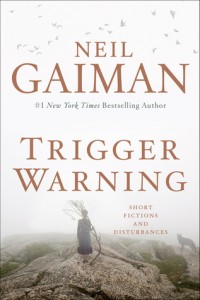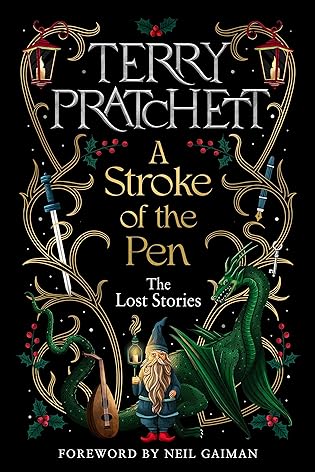 A Stroke of the Pen: The Lost Stories by Terry Pratchett, Neil Gaiman
A Stroke of the Pen: The Lost Stories by Terry Pratchett, Neil Gaiman Format: eARC
Source: supplied by publisher via Edelweiss
Formats available: hardcover, paperback, ebook, audiobook
Genres: fantasy, short stories
Pages: 240
Published by Doubleday on October 10, 2023
Purchasing Info: Author's Website, Publisher's Website, Amazon, Barnes & Noble, Kobo, Bookshop.org, Better World Books
Goodreads
Far away and long ago, when dragons still existed and the only arcade game was ping-pong in black and white, a wizard cautiously entered a smoky tavern in the evil, ancient, foggy city of Morpork...
A truly unmissable, beautifully illustrated collection of unearthed stories from the pen of Sir Terry Pratchett: award-winning and bestselling author, and creator of the phenomenally successful Discworld series.
Twenty early short stories by one of the world's best loved authors, each accompanied by exquisite original woodcut illustrations.
These are rediscovered tales that Pratchett wrote under a pseudonym for newspapers during the 1970s and 1980s. Whilst none are set in the Discworld, they hint towards the world he would go on to create, containing all of his trademark wit, satirical wisdom and fantastic imagination.
Meet Og the inventor, the first caveman to cultivate fire, as he discovers the highs and lows of progress; haunt the Ministry of Nuisances with the defiant evicted ghosts of Pilgarlic Towers; visit Blackbury, a small market town with weird weather and an otherworldly visitor; and go on a dangerous quest through time and space with hero Kron, which begins in the ancient city of Morpork...
My Review:
I first became acquainted with the Discworld and its creator – or perhaps perpetrator would be the better word – in the early to mid 1990s when I had a long commute, audiobooks were still on actual tape, and the collection of same at the library where I worked wasn’t all that big because there wasn’t all that much available.
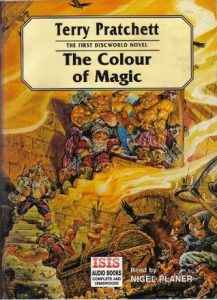 Two of those available titles were The Colour of Magic and The Light Fantastic, the first two books in the Discworld . It wasn’t exactly love at first listen because those first two books were a bit weirder than I expected, and looking back from the perspective of even Mort, only two books later, it was pretty clear that the author figured out he had a series going on somewhen approximately between The Light Fantastic and book 3, Equal Rites.
Two of those available titles were The Colour of Magic and The Light Fantastic, the first two books in the Discworld . It wasn’t exactly love at first listen because those first two books were a bit weirder than I expected, and looking back from the perspective of even Mort, only two books later, it was pretty clear that the author figured out he had a series going on somewhen approximately between The Light Fantastic and book 3, Equal Rites.
I don’t think he was all the way there until book 8, Guards! Guards!, which is a much better entry point for the series. (I digress – but hopefully not too far or I’ll fall off the edge.)
The point I’m working my way around is that masterpieces like the Discworld do not spring fully formed from the head of Zeus – or even two Zeuses in the case of Good Omens, co-authored with Neil Gaiman.
The stories in this collection, these ‘strokes of the pen’ by Sir Terry Pratchett, are a bit of a portrait of the beloved author as a young scrivener who was still in the process of figuring out what in the hell he was doing and quite possibly where was he going in that handcart.
The story of these stories is a bit of a story all by itself. They were published – these are not early efforts that were never intended to see the light of day. It’s just that they were published in a tabloid newspaper, the Western Daily Press, published in Bristol in the U.K. from 1967 to 1984, mostly under the pseudonym Patrick Kearns.
But the Western Daily Press was – and still is – a very small newspaper. The stories were published, read and mostly forgotten, with the exception of “The Quest for the Keys” which had been cut out and preserved by one enterprising fan – howsomever without any of the borders of the pages which would have revealed where and when it was published. A painstaking search through the British Library’s Newspaper Archive resulted in the discoveries that have been published in this collection.
The stories themselves are a LOT of fun. Every single one gives the reader a chuckle or at least a smile, and there are hints of what evolved into Pratchett’s style of both telling the story and making snide asides about the circumstances even in the earliest instances.
But they are very, very short, and with the exception of “The Quest for the Keys”, which was published in four parts, it’s obvious that the newspaper had limited space for fiction – and probably everything else. So these are touches, tastes, teasers and don’t get into a lot of detail.
Still, by grouping them in little series, the reader does get a pretty clear picture of places like Blackbury [sic] which seems like it could be just around the corner from Unseen University – no matter how much the stories refer to far-distant London. Which could, with a bit of a squint, be Ankh-Morpork.
Although, speaking of Ankh-Morpork, the final story in the collection, “The Quest for the Keys”, is set in the city of Morpork. Perhaps the annexation of Ankh is just around its corner. And again, a bit of a squint turns the lazy and underhanded wizard Grubble into the more inept but much nicer about it Rincewind of The Colour of Magic, while the hired sword Grubble has hired and duped, Kron, seems more than a bit like a younger and savvier Cohen the Barbarian, perhaps with just a touch of the inestimable Sam Vimes.
Escape Rating B: A Stroke of the Pen isn’t exactly the Discworld , but it is Discworld -adjacent. Which is as close as it’s possible to get now that its author, creator and perpetrator is no longer among us. It’s at that intersection of not being sure whether to cry because it’s over, or smile because it happened. The stories themselves are generally fun but not terribly deep, because there wasn’t time in the format to get that way.
So, think of this collection as a last twinkle of the author’s eye, and enjoy!

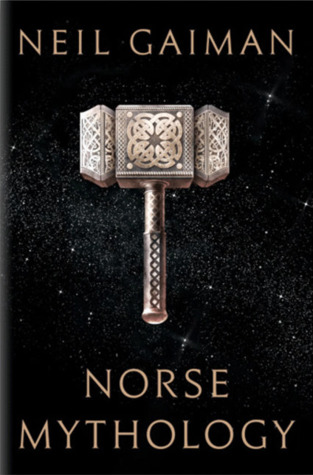 Norse Mythology by
Norse Mythology by 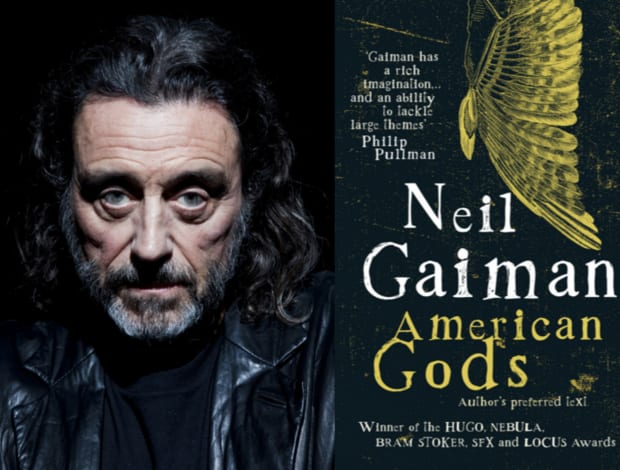
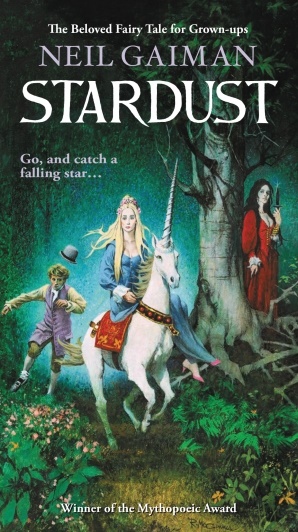 Stardust by
Stardust by 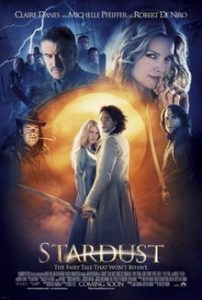 Never judge a book by its movie. I saw the movie
Never judge a book by its movie. I saw the movie 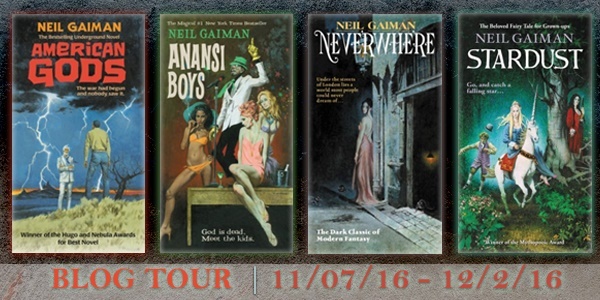
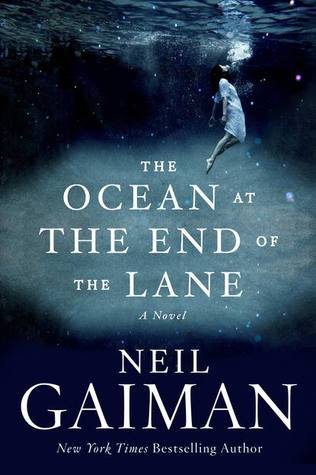 The Ocean at the End of the Lane by
The Ocean at the End of the Lane by 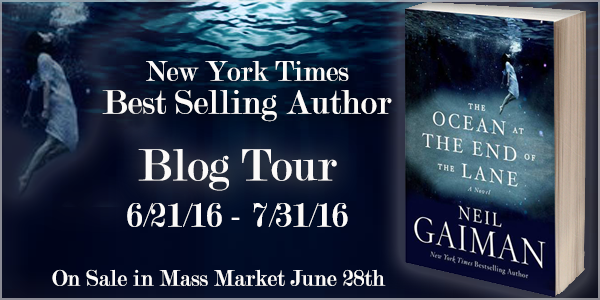
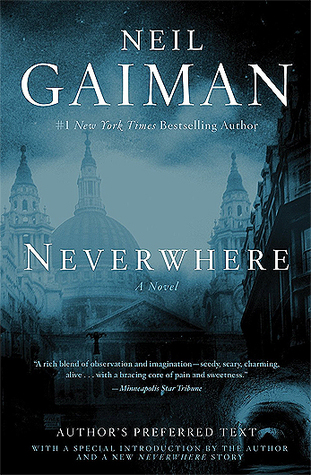 Neverwhere by
Neverwhere by  I’m not sure whether I first went to Neverwhere by reading the book or watching the TV miniseries. Needless to say,
I’m not sure whether I first went to Neverwhere by reading the book or watching the TV miniseries. Needless to say, 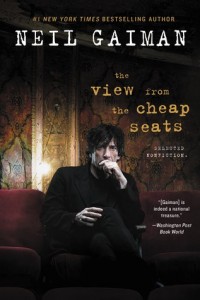 This time, I listened to parts of Neverwhere from an unabridged audiobook recorded by the author. And unlike many authors who read their own works, Gaiman does an excellent job voicing all the characters, to the point where I was still hearing his voice in my head a couple of weeks ago when I was reading
This time, I listened to parts of Neverwhere from an unabridged audiobook recorded by the author. And unlike many authors who read their own works, Gaiman does an excellent job voicing all the characters, to the point where I was still hearing his voice in my head a couple of weeks ago when I was reading 
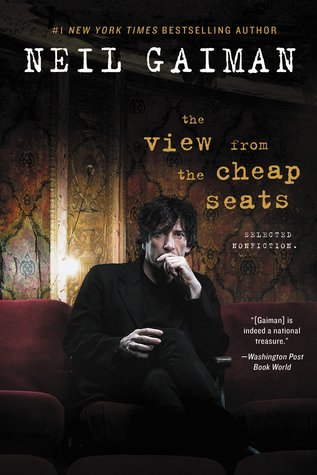 The View from the Cheap Seats: Selected Nonfiction by
The View from the Cheap Seats: Selected Nonfiction by 